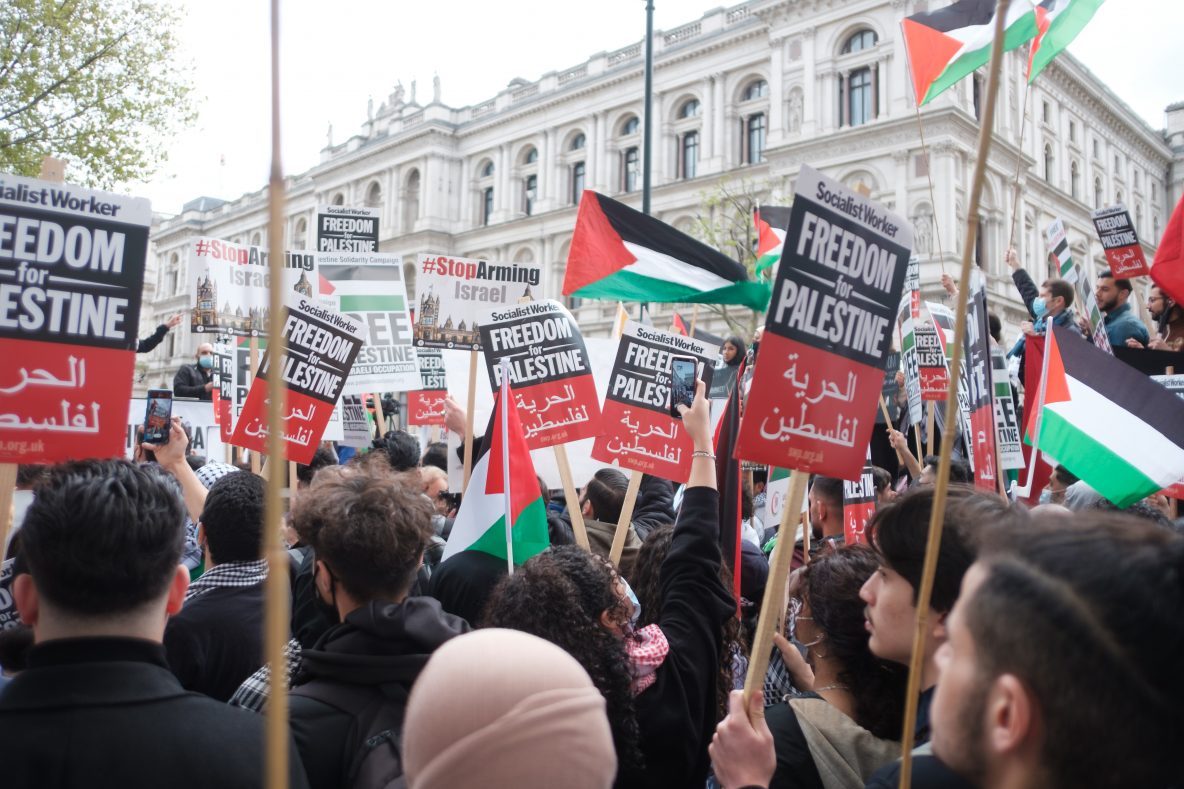The Israel Palestine Conflict: Another Escalation in Violence
Why the conflict has escalated in recent weeks, and why the Israeli government must be held accountable.
By Lauren McLoughlin / 28 May 2021
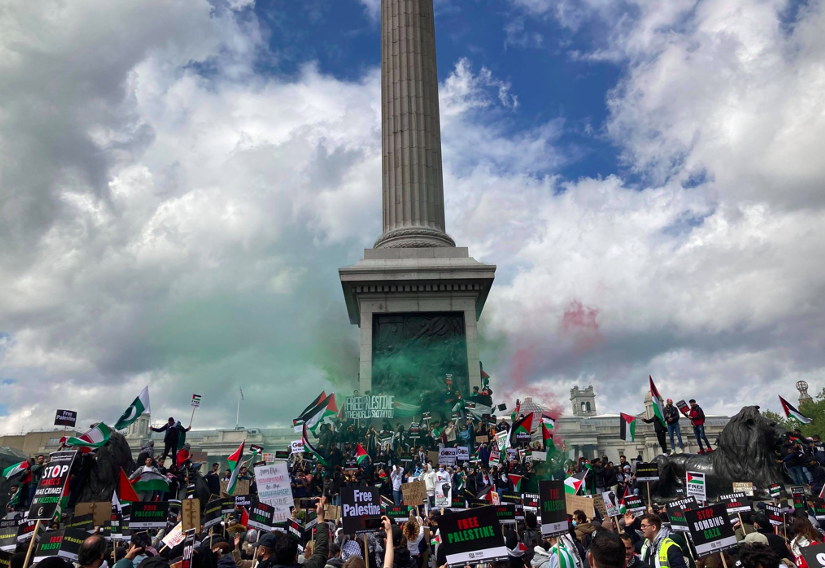
Photo by Eimear McCourt
Relations between Israel and Palestine have been volatile since Israel’s formation in 1948. Their history is one layered with violence and intolerance, entrenched within the complexities of religion, national identity and the notion of “home”.
In short, the conflict is much more than a political feud. Over time, attempts at a solution have become more idealistic than realistic and, after the events of the last few weeks, that hope seems more depleted than ever.
For more on the history of the conflict, read Isobel McCarthy's article here.
In the past weeks, the skies of Israel and Gaza have been littered with missiles and smoke, protests and violence between Palestinians and Israeli Jews have erupted throughout Israel and the Palestinian Territories, and the death toll continues to climb. The cause of the conflict’s recent rapid escalation is complex, consisting of a series of events that have served to rupture the already unstable situation and incite violence on both sides.
Firstly, the threat of eviction for over 70 Palestinians who live in the neighbourhood of Sheikh Jarrah in East Jerusalem provoked uproar amongst Palestinian citizens. An Israeli court ruled that the homes were built on land owned by Jewish religious associations prior to Israel’s establishment in 1948, and thus have decided to replace the Palestinian families who reside there with Jewish ones. These evictions form part of a broader initiative by the Israeli government to push Palestinians out of East Jerusalem and other parts of Palestine in an effort to diminish the possibility of an independent Palestinian state.
Following this ruling, on April 12, Israeli police barricaded the Damascus Gate Plaza in the East Wing of Jerusalem, supposedly in an attempt to regulate the number of pedestrians entering the Old City. This closure occurred over Ramadan, in which the area is significant as a gathering place for Muslim worshippers. Whilst the barriers were eventually removed by Israel’s police commissioner Kobi Shabtai after pressure from the global Islamic community, anger amongst Palestinians at the policing of their bodies and religious activities during the holy month had already reached a critical point.
Days later, on April 16, Israel limited the number of people able to pray at the Al-Aqsa mosque, considered the third holiest mosque in Islam, to 10,000. Tens of thousands of Muslims flock to Al-Aqsa every year to celebrate the last Friday of Ramadan, and this limitation exacerbated tensions between Palestinian worshippers and Israeli police.
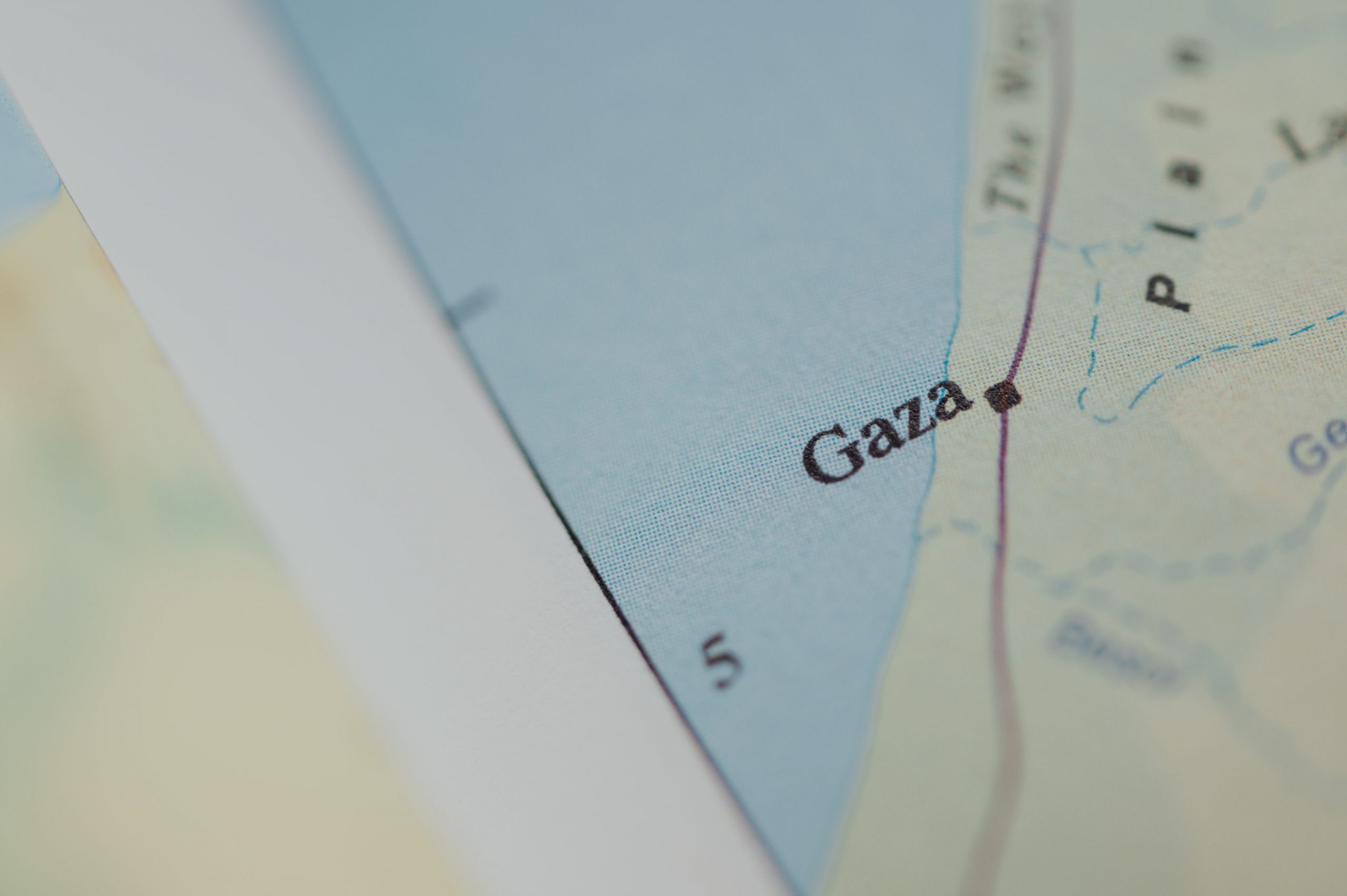
Photo by CHUTTERSNAP on Unsplash
Palestinians loaded the mosque with rocks in preparation for violence.
Violence erupted after two Palestinian men attempted to break through the barriers, with Israeli police firing rubber-tipped bullets and stun grenades onto the worshippers, whilst Palestinians threw bottles and stones in retaliation. Over 300 Palestinians and 20 Israeli police were injured, with the UN stating the severity of the Israeli police’s response was “unwarranted, disproportionate and indiscriminate”.
The unrest escalated further with the right-wing Israeli flag march throughout the Old City on May 9 - Jerusalem Day. For Zionist Jews, Jerusalem Day commemorates the “liberation” and “reunification” of Jerusalem under Jewish sovereignty, a day full of pride and hope; for Palestinians, the day has come to symbolise their ongoing oppression; a reminder of the losses they have suffered and endured throughout the duration of the conflict.
Closely watching the events unfold in Jerusalem was Hamas, the militant group currently in control of Gaza. On May 10, after demanding that Israel withdraw their police presence in East Jerusalem and the Al-Aqsa mosque, Hamas launched a barrage of rockets towards Israel. Israel responded by launching an airstrike. Since then, both Israel and Gaza have been engaged in a ceaseless campaign of airstrikes and bombings. On May 17, Israel bombarded Gaza with the most devastating wave of strikes yet, allegedly to destroy a series of underground tunnels underneath the city used by militants.
Now, with at least 213 Palestinians and 12 Israelis dead, including 59 Palestinian and 2 Israeli children, pressure is mounting from the global diplomatic community for Israel and Hamas to call a ceasefire. Nonetheless, Israel’s Prime Minister Benjamin Netanyahu has since stated that Israel must “levy a heavy price on Hamas”, indicating his intention to prolong the conflict.
It is clear that atrocities are being committed on both sides of this conflict, and with neither a solution nor a conclusion currently distinguishable, Israel and Palestine appear locked in a perpetual cycle of bloodshed that is beginning to raise questions about morality and accountability of each of their governments.
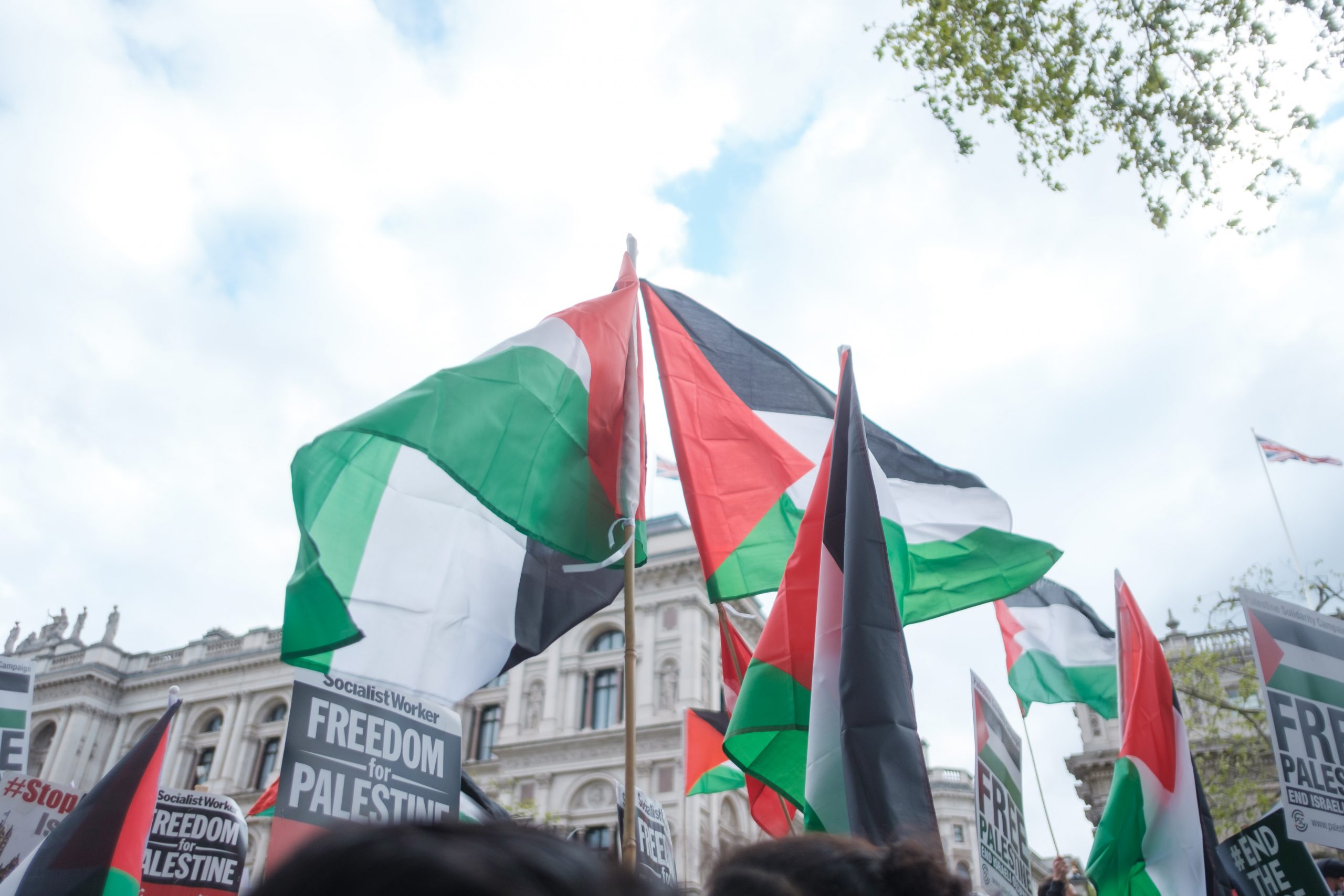
Photo by Ehimetalor Akhere Unuabona on Unsplash
Still, in summarising and disputing the hostilities between Hamas and Israel in recent weeks, we must not forget to examine the bigger picture; a bleak portrait of Palestinian oppression and displacement suffered at the hands of an Israeli government whose own country benefits from its brutality in the form of wealth, land and legitimacy.
Despite initially agreeing to the borders proposed in the UN’s two-state solution in 1947, after the widespread Arab rejection of this proposal and the resultant 1948 war, Israel has swiftly and unapologetically expanded its own state at the expense of the Palestinian people.
Approximately 80% of former Palestine has now been absorbed into Israel, with Palestinians being expelled from everywhere but the West Bank and the Gaza Strip. It is estimated that there are around 7 million Palestinian refugees scattered across the world as a result of Israel’s aggressive expansion.
In the remaining 20% of former Palestine, Israel continues to exert devastating policies over the Palestinian people.
In the West Bank, numerous Jewish settler groups knowingly build their homes on Palestinian soil, claiming the land as their “birth-right”. As they slowly encroach upon and divide Palestinian communities, they dilute hopes of a future independent Palestine or a viable two-state solution to the conflict. Whilst many international lawyers have denounced these Jewish settlements as a violation of the Fourth Geneva Convention, the Israeli government consistently defends and endorses them.
In Gaza, Israel continues to subject the people to a suffocating land, air and sea blockade that began in 2007, trapping them within the 60-kilometre wall that surrounds the area. The 14-year blockade has limited the people’s access to food, clean water, healthcare, education, employment and electricity. As a result, over 80% of the population is currently dependent on humanitarian aid for survival, and the poverty rate stands at over 56%.
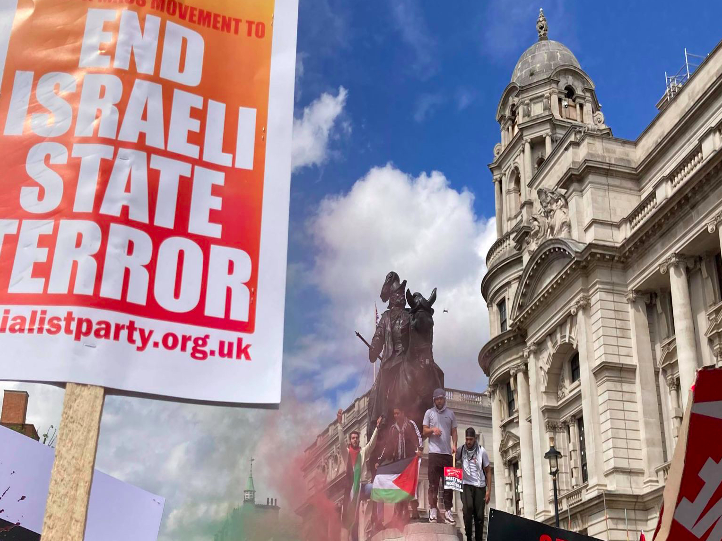
Photo by Eimear McCourt
The blockade itself has been called a “flagrant violation of international law” by the human rights organisation Amnesty International.
With this in mind, Israel’s bombardment of Gaza with airstrikes - wiping out medical centres, residential buildings and media offices, and destroying the only COVID centre in Gaza without pausing to allow aid workers to retrieve the injured - seems less an act of self-defence and more an attempt to further cripple Palestinian livelihood and national identity.
Worse still, Israel’s ethnic cleansing of Palestinians is endorsed and funded by the US and other Western governments. Nearly $4 billion a year is given to Israel from the United States under the guise of “military aid”. Just last week, in spite of the devastation suffered by Gaza since May 10th, the Biden administration approved a $735 million weapons sale to Israel.
Though Biden’s blind and problematic support of Israel’s “right to defend itself” is heavily contested by other members of the Democratic party, it is a stark reminder of how political advantage continues to eclipse morality in the minds of our world leaders.
Of course, the violence and atrocities committed by Hamas are equally indefensible, but for Israel, a country with far greater military prowess, power, wealth and global recognition, the comparison of their actions to those of a group largely regarded as a terrorist organisation should not be a justification, but a disgrace.
As accusations of genocide and ethnic cleansing mount against the Israeli government, a two-state solution to the conflict, one in which Palestine and Israel co-exist distinctly and peacefully, seems less plausible than ever. For the moment, a lasting cessation of the current hostilities is crucial, with hopes pinned on the success of the current ceasefire agreement to bring an end to this devastating saga of bloodshed.
Words by
Share this article

